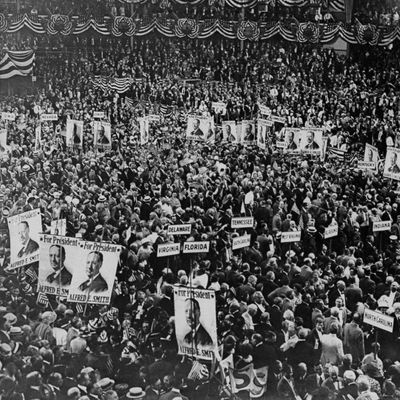
When weird stuff happens in politics, it sometimes seems appropriate to resort to weird theories in order to explain it all. That’s probably what drove The New Republic’s Alex Pareene to speculate that late entries into the 2020 presidential contest by Mike Bloomberg and Deval Patrick represent a gamble by shadowy Democratic elites on a “brokered convention” in Milwaukee next July.
[T]his is the only way these two late entrants make any sense. The Patrick and Bloomberg campaigns are not mere long-shots, or attempts to harm Sanders or Warren on behalf of the moderates. They are calculated bets on a brokered convention. These are well-connected people at the highest levels of Democratic Party politics (despite his independent status, Bloomberg has always surrounded himself with Democratic campaign veterans and aides), making it clear that they believe there is a real chance that the nomination will be completely up for grabs next July.
Pareene makes it clear he is not predicting this outcome, but is simply trying to understand why two smart pols surrounded by smart people would launch such doomed candidacies. And he’s right: neither Bloomberg nor Patrick has anything like a plausible path to the nomination via conventional means. He doesn’t really explain why anyone would think a deadlocked convention packed with delegates originally pledged to candidates who are mostly to the left of these gentlemen would turn to either of them. Perhaps Bloomberg and Patrick have more confidence in the power of the Democratic Establishment than I have; hence the alleged belief (which I do not share) that there is someone in a position to “broker” a contested convention.
But let’s just put that aside and discuss exactly how, mechanically, these candidacies would keep Democratic voters from choosing a nominee before the convention, as they have regularly done since the big switch to elected rather than appointed delegates prior to 1972.
The biggest risk of a contested convention would arise from a logjam of multiple candidates with different but relatively even bases of support who are accumulating enough delegates to make staying the course sensible. The institutional mechanism Democrats have for keeping that from happening is the 15-percent threshold for winning delegates at all (at either the statewide or congressional-district level; the precise mix varies from state to state). Additional, well-funded candidacies at this late date are likely to reduce, not increase, the odds of multiple rivals staying above 15 percent for an extended length of time, while also making it harder for some dark horse (e.g., Amy Klobuchar) to achieve viability before it’s too late.
Let’s look at some specific scenarios. Patrick will almost certainly begin his campaign with a near-exclusive focus on New Hampshire, where he is a familiar figure due to his longtime presence on Boston TV. If he does relatively well, from whom will he draw votes? Probably from Joe Biden and Pete Buttigieg, and the various quasi-centrist bottom-feeders in the field who may be struggling to survive by then. It’s unlikely anything other than Biden’s own mouth (and probably not even that) can knock him out of the race that early, but Mayor Pete could be in peril of heading toward extremely difficult contests in Nevada and South Carolina, mortally wounded if he underperforms in New Hampshire. But in any event, Patrick will either do so poorly that no contested convention would even begin to think of turning to him, or he’ll help winnow the field, which makes a contested convention even less likely than ever.
Bloomberg’s strategy, if he has one, is to spend giant buckets of money in the Super Tuesday states where rivals won’t have the wherewithal to compete everywhere. But again, his presence is more likely to knock a survivor or two of the early-state gauntlet below the threshold for winning delegates than to prevent the emergence of a front-runner. And let’s say Bloomberg does really well on Super Tuesday. That would likely produce a consolidation of progressive voters determined to keep an ex-Republican billionaire from buying the nomination. Assuming Sanders and Warren both remain viable after South Carolina, a Bloomberg threat could force many of their supporters to choose between them once and for all. Again, the effect might be to winnow the field and keep others from rising to viability.
I think the more realistic scenario is that Deval Patrick vanishes without a trace after New Hampshire, and Bloomberg becomes simply a giant dollar sign representing a warning to progressives that they’d better not get too carried away with their attacks on the financial sector and other wealthy pockets of “centrist” sentiment. Pareene considers and rejects the idea that either of the late entrants is in the race strictly to damage Sanders or Warren. But there’s no question that if he chose to do so, Bloomberg could go after either or both of them with the most expensive negative ad campaign in political history (along with direct attacks during candidate debates, if he can buy his way onto the stage). What would that produce? Well, either the final “struggle for the soul of the Democratic Party” that pundits long for almost as much as a “brokered convention,” or the rise of a unity candidate, who would not be named Michael Bloomberg or Deval Patrick. If Democratic elites really do think they can manipulate Democratic voters into producing a contested convention and then a coup in Milwaukee, they are about to find out how imaginary their power actually is.






























